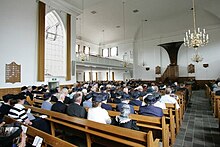The Protestant Church in the Netherlands is the largest Protestant denomination in the Netherlands, being both Calvinist and Lutheran.

The Christian Reformed Church in North America is a Protestant Calvinist Christian denomination in the United States and Canada. Having roots in the Dutch Reformed Church of the Netherlands, the Christian Reformed Church was founded by Dutch immigrants in 1857 and is theologically Calvinist.
The Dutch Reformed Church was the largest Christian denomination in the Netherlands from the onset of the Protestant Reformation in the 16th century until 1930. It was the traditional denomination of the Dutch royal family and the foremost Protestant denomination until 2004, the year it helped found and merged into the Protestant Church in the Netherlands. It was the larger of the two major Reformed denominations, after the Reformed Churches in the Netherlands was founded in 1892. It spread to the United States, South Africa, Indonesia, Sri Lanka, Brazil, and various other world regions through Dutch colonization. Allegiance to the Dutch Reformed Church was a common feature among Dutch immigrant communities around the world and became a crucial part of Afrikaner nationalism in South Africa.

The Reformed Churches in the Netherlands was the second largest Protestant church in the Netherlands and one of the two major Calvinist denominations along with the Dutch Reformed Church since 1892 until being merged into the Protestant Church in the Netherlands (PKN) in 2004. The PKN is the continuation of the Dutch Reformed Church, the Reformed Churches in the Netherlands and the Evangelical Lutheran Church in the Kingdom of the Netherlands.
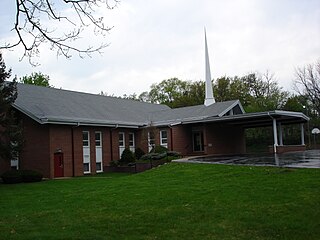
The Netherlands Reformed Congregations is a conservative Calvinist denomination with congregations in Canada, the United States and Bolivia. It is affiliated with the Reformed Congregations in the Netherlands.
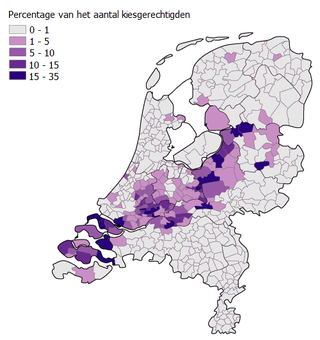
The Bible Belt is a strip of land in the Netherlands with the highest concentration of conservative orthodox Reformed Protestants in the country. Although the term is of recent origin the Dutch Bible Belt has existed for many generations.
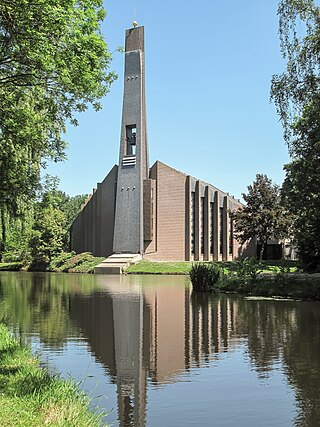
The Christian Reformed Churches in the Netherlands is a Protestant church in the Netherlands.

Nieuwerkerk is a village in the Dutch province of Zeeland. It is a part of the municipality of Schouwen-Duiveland, and lies about 23 km south of Hellevoetsluis.

The Reformed Churches in the Netherlands (Liberated) (Dutch: Gereformeerde Kerken in Nederland (vrijgemaakt)) was an orthodox Calvinist federation of churches. This church body arose in 1944 out of the so-called Liberation (Vrijmaking) from the Reformed Churches in the Netherlands, when many pastors and members refused to go along with the General Synod's demand to hold to "presumed regeneration of infants" at their baptism. Klaas Schilder played an important role in the Liberation. There were 270 affiliated local congregations with a total of about 120,000 members in 2016.
The Netherlands Reformed Churches was a conservative Reformed Protestant Christian denomination in the Kingdom of the Netherlands. The denomination was formed in 1967 following a schism within the Reformed Churches in the Netherlands (Liberated).
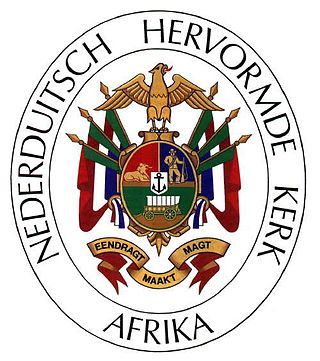
The Dutch Reformed Church in Africa is a Reformed Christian denomination based in South Africa. It also has congregations in Namibia, Botswana, Zambia and Zimbabwe. Along with the Dutch Reformed Church in South Africa (NGK) and the Reformed Churches in South Africa, the NHKA is one of the three Dutch Reformed sister churches of South Africa. The NHKA retains the old Nomenclature Nederduitsch, the word originally referring to the Dutch language. The word refers to the Low Saxon language today. The Dutch language remained the official language of the church until 1933 when the church started functioning almost exclusively in Afrikaans.
The 1886 Dutch Reformed Church split, also known as the Doleantie, was the name of a prominent schism in the Dutch Reformed Church that took place in 1886 and was led by a renowned minister, Abraham Kuyper. The Doleantie was not the first schism in the Dutch Reformed Church. Another schism, the Secession of 1834 (Afscheiding van 1834), had led to the formation of the Christian Reformed Church in the Netherlands.
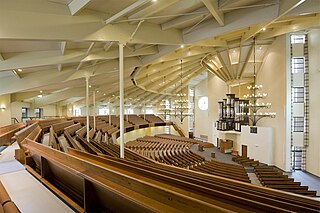
De Hoeksteen in Barneveld, the Netherlands, is the second largest church building in the Netherlands. It is used by the congregation of the Gereformeerde Gemeenten in Nederland, a highly conservative denomination. The church services are conducted using exclusively the Statenvertaling of the Bible.

The Reformed Congregations is a conservative Reformed church with 152 congregations in the Netherlands, 1 in Randburg, South Africa and 1 congregation in Carterton, New Zealand. The denomination has approximately 107,015 members as of 1 January 2024. It is Calvinist in theology. It is affiliated with the North American Netherlands Reformed Congregations.
The Reformed Congregations in North America form a denomination, Continental Reformed, established in 1967 in the United States and Canada, by dissidents from Netherlands Reformed Congregations.
The Reformed Presbyterian Church of Malawi was initiated by mission work of the Free Presbyterian Church of Scotland, and was founded in 1985. There are more than 200 congregations and 7.000 to 10.000 members mainly in rural areas of central and southern Malawi. Since 2006 the Hersteld Hervormde Kerk of the Netherlands Restored Reformed Church supports this denomination.
The Reformed Churches (Restored) (Dutch: Gereformeerde Kerken in Nederland (hersteld)), also known as the New Liberated Churches (Dutch: Nieuwe Vrijgemaakte Kerken) constituted a Christian denomination in the Netherlands. It separated from the Reformed Churches in the Netherlands (Liberated) in 2003. Officially named the "Reformed Churches in the Netherlands", they were usually called the "Reformed Churches (Restored)" to avoid confusion with the Reformed Churches in the Netherlands (Liberated) and the Reformed Churches in the Netherlands (GKN).
The Reformed Association in the Protestant Church in the Netherlands is a confessional orthodox Calvinist group and movement within the Protestant Church in the Netherlands.
The Maranatha Reformed Church of Christ (MRCC) is a Christian Reformed denomination founded in 1923, in South Africa, by former members of the Free Church of Scotland, due to disputes relating to the administration of the sacraments.
Jan van der Graaf was a Dutch church administrator and engineer. He was General Secretary of the Reformed Association in the Dutch Reformed Church between 1973 and 2000. Van der Graaf also wrote several books, was chief editor of the Reformed Association's magazine De Waarheidsvriend and associated with the Evangelische Omroep.

